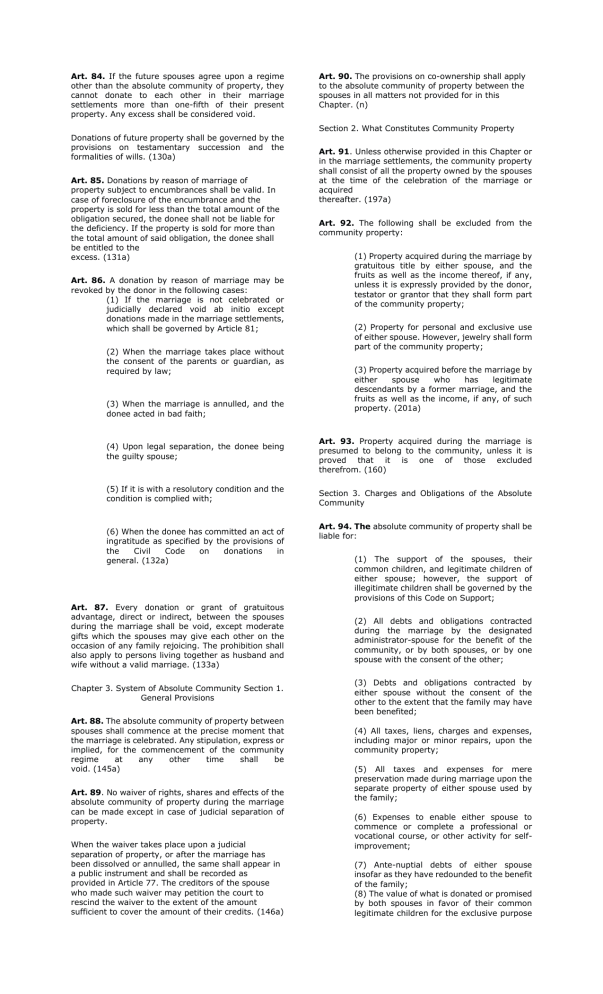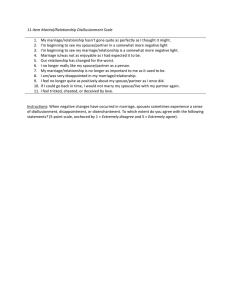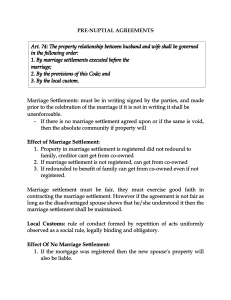
Art. 84. If the future spouses agree upon a regime other than the absolute community of property, they cannot donate to each other in their marriage settlements more than one-fifth of their present property. Any excess shall be considered void. Art. 90. The provisions on co-ownership shall apply to the absolute community of property between the spouses in all matters not provided for in this Chapter. (n) Section 2. What Constitutes Community Property Donations of future property shall be governed by the provisions on testamentary succession and the formalities of wills. (130a)Cy Art. 85. Donations by reason of marriage of property subject to encumbrances shall be valid. In case of foreclosure of the encumbrance and the property is sold for less than the total amount of the obligation secured, the donee shall not be liable for the deficiency. If the property is sold for more than the total amount of said obligation, the donee shall be entitled to the excess. (131a)ChanRoblesVirtualawlibrary Art. 86. A donation by reason of marriage may be revoked by the donor in the following cases: (1) If the marriage is not celebrated or judicially declared void ab initio except donations made in the marriage settlements, which shall be governed by Article 81; (2) When the marriage takes place without the consent of the parents or guardian, as required by law; (3) When the marriage is annulled, and the donee acted in bad faith; ChanRoblesVirtualawlibrary Art. 91. Unless otherwise provided in this Chapter or in the marriage settlements, the community property shall consist of all the property owned by the spouses at the time of the celebration of the marriage or acquired thereafter. (197a)ChanRoblesVirtualawlibrary Art. 92. The following shall be excluded from the community property: (1) Property acquired during the marriage by gratuitous title by either spouse, and the fruits as well as the income thereof, if any, unless it is expressly provided by the donor, testator or grantor that they shall form part of the community property; (2) Property for personal and exclusive use of either spouse. However, jewelry shall form part of the community property; (3) Property acquired before the marriage by either spouse who has legitimate descendants by a former marriage, and the fruits as well as the income, if any, of such property. (201a)ChanRoblesVirtualawlibrary (4) Upon legal separation, the donee being the guilty spouse; ChanRoblesVirtualawlibrary Art. 93. Property acquired during the marriage is presumed to belong to the community, unless it is proved that it is one of those excluded therefrom. (160) chan robles virtual law library (5) If it is with a resolutory condition and the condition is complied with; ChanRoblesVirtualawlibrary Section 3. Charges and Obligations of the Absolute Community (6) When the donee has committed an act of ingratitude as specified by the provisions of the Civil Code on donations in general. (132a)Chan RoblesVirtualawlibrary Art. 87. Every donation or grant of gratuitous advantage, direct or indirect, between the spouses during the marriage shall be void, except moderate gifts which the spouses may give each other on the occasion of any family rejoicing. The prohibition shall also apply to persons living together as husband and wife without a valid marriage. (133a) Chapter 3. System of Absolute Community Section 1. General Provisions Art. 88. The absolute community of property between spouses shall commence at the precise moment that the marriage is celebrated. Any stipulation, express or implied, for the commencement of the community regime at any other time shall be void. (145a)ChanRoblesVirtualawlibrary Art. 89. No waiver of rights, shares and effects of the absolute community of property during the marriage can be made except in case of judicial separation of property. When the waiver takes place upon a judicial separation of property, or after the marriage has been dissolved or annulled, the same shall appear in a public instrument and shall be recorded as provided in Article 77. The creditors of the spouse who made such waiver may petition the court to rescind the waiver to the extent of the amount sufficient to cover the amount of their credits. (146a) Art. 94. The absolute community of property shall be liable for: (1) The support of the spouses, their common children, and legitimate children of either spouse; however, the support of illegitimate children shall be governed by the provisions of this Code on Support; (2) All debts and obligations contracted during the marriage by the designated administrator-spouse for the benefit of the community, or by both spouses, or by one spouse with the consent of the other; (3) Debts and obligations contracted by either spouse without the consent of the other to the extent that the family may have been benefited; (4) All taxes, liens, charges and expenses, including major or minor repairs, upon the community property; (5) All taxes and expenses for mere preservation made during marriage upon the separate property of either spouse used by the family; (6) Expenses to enable either spouse to commence or complete a professional or vocational course, or other activity for selfimprovement; (7) Ante-nuptial debts of either spouse insofar as they have redounded to the benefit of the family; (8) The value of what is donated or promised by both spouses in favor of their common legitimate children for the exclusive purpose of commencing or completing a professional or vocational course or other activity for selfimprovement; (9) Ante-nuptial debts of either spouse other than those falling under paragraph (7) of this Article, the support of illegitimate children of either spouse, and liabilities incurred by either spouse by reason of a crime or a quasidelict, in case of absence or insufficiency of the exclusive property of the debtor-spouse, the payment of which shall be considered as advances to be deducted from the share of the debtor-spouse upon liquidation of the community; and (10) Expenses of litigation between the spouses unless the suit is found to be groundless. If the community property is insufficient to cover the foregoing liabilities, except those falling under paragraph (9), the spouses shall be solidarily liable for the unpaid balance with their separate properties. (161a, 162a, 163a, 202a-205a) Art. 95. Whatever may be lost during the marriage in any game of chance, betting, sweepstakes, or any other kind of gambling, whether permitted or prohibited by law, shall be borne by the loser and shall not be charged to the community but any winnings therefrom shall form part of the community property. (164a) Section 4. Ownership, Administrative, Enjoyment and Disposition of the Community Property Art. 96. The administration and enjoyment of the community property shall belong to both spouses jointly. In case of disagreement, the husband's decision shall prevail, subject to recourse to the court by the wife for proper remedy, which must be availed of within five years from the date of the contract implementing such decision. In the event that one spouse is incapacitated or otherwise unable to participate in the administration of the common properties, the other spouse may assume sole powers of administration. These powers do not include disposition or encumbrance without authority of the court or the written consent of the other spouse. In the absence of such authority or consent, the disposition or encumbrance shall be void. However, the transaction shall be construed as a continuing offer on the part of the consenting spouse and the third person, and may be perfected as a binding contract upon the acceptance by the other spouse or authorization by the court before the offer is withdrawn by either or both offerors. (206a) Art. 97. Either spouse may dispose by will of his or her interest in the community property. (n) Art. 98. Neither spouse may donate any community property without the consent of the other. However, either spouse may, without the consent of the other, make moderate donations from the community property for charity or on occasions of family rejoicing or family distress. (n) Section 5. Dissolution of Absolute Community Regime (4) In case of judicial separation of property during the marriage under Articles 134 to 138. (175a)ChanRoblesVirtualawlibrary Art. 100. The separation in fact between husband and wife shall not affect the regime of absolute community except that: (1) The spouse who leaves the conjugal home or refuses to live therein, without just cause, shall not have the right to be supported; (2) When the consent of one spouse to any transaction of the other is required by law, judicial authorization shall be obtained in a summary proceeding; (3) In the absence of sufficient community property, the separate property of both spouses shall be solidarily liable for the support of the family. The spouse present shall, upon proper petition in a summary proceeding, be given judicial authority to administer or encumber any specific separate property of the other spouse and use the fruits or proceeds thereof to satisfy the latter's share. (178a) Art. 101. If a spouse without just cause abandons the other or fails to comply with his or her obligations to the family, the aggrieved spouse may petition the court for receivership, for judicial separation of property or for authority to be the sole administrator of the absolute community, subject to such precautionary conditions as the court may impose. The obligations to the family mentioned in the preceding paragraph refer to marital, parental or property relations. A spouse is deemed to have abandoned the other when her or she has left the conjugal dwelling without intention of returning. The spouse who has left the conjugal dwelling for a period of three months or has failed within the same period to give any information as to his or her whereabouts shall be prima facie presumed to have no intention of returning to the conjugal dwelling. (178a) Section 6. Liquidation of the Absolute Community Assets and Liabilities Art. 102. Upon dissolution of the absolute community regime, the following procedure shall apply: (1) An inventory shall be prepared, listing separately all the properties of the absolute community and the exclusive properties of each spouse. (2) The debts and obligations of the absolute community shall be paid out of its assets. In case of insufficiency of said assets, the spouses shall be solidarily liable for the unpaid balance with their separate properties in accordance with the provisions of the second paragraph of Article 94. (3) Whatever remains of the exclusive properties of the spouses shall thereafter be delivered to each of them. Art. 99. The absolute community terminates: (1) Upon the death of either spouse; (2) When there separation; is a decree of legal (3) When the marriage is annulled or declared void; or (4) The net remainder of the properties of the absolute community shall constitute its net assets, which shall be divided equally between husband and wife, unless a different proportion or division was agreed upon in the marriage settlements, or unless there has been a voluntary waiver of such share provided in this Code. For purpose of computing the net profits subject to forfeiture in accordance with Articles 43, No. (2) and 63, No. (2), the said profits shall be the increase in value between the market value of the community property at the time of the celebration of the marriage and the market value at the time of its dissolution. (5) The presumptive legitimes of the common children shall be delivered upon partition, in accordance with Article 51. (6) Unless otherwise agreed upon by the parties, in the partition of the properties, the conjugal dwelling and the lot on which it is situated shall be adjudicated to the spouse with whom the majority of the common children choose to remain. Children below the age of seven years are deemed to have chosen the mother, unless the court has decided otherwise. In case there in no such majority, the court shall decide, taking into consideration the best interests of said children. (n)ChanRoblesVirtualawlibrary Art. 103. Upon the termination of the marriage by death, the community property shall be liquidated in the same proceeding for the settlement of the estate of the deceased. If no judicial settlement proceeding is instituted, the surviving spouse shall liquidate the community property either judicially or extra-judicially within six months from the death of the deceased spouse. If upon the lapse of the six months period, no liquidation is made, any disposition or encumbrance involving the community property of the terminated marriage shall be void. Should the surviving spouse contract a subsequent marriage without compliance with the foregoing requirements, a mandatory regime of complete separation of property shall govern the property relations of the subsequent marriage. (n)ChanRoblesVirtualawlibrary Art. 104. Whenever the liquidation of the community properties of two or more marriages contracted by the same person before the effectivity of this Code is carried out simultaneously, the respective capital, fruits and income of each community shall be determined upon such proof as may be considered according to the rules of evidence. In case of doubt as to which community the existing properties belong, the same shall be divided between the different communities in proportion to the capital and duration of each. (189a) SERRANO VS SOLOMON FACTS: Melchor Solomon and Alejandria Feliciano was married on June 21, 1948 and on the same day but before the ceremony, Melchor executed the alleged deed of donation. On March 2, 1949, Alejandria died without a child. Several months later, Serrano seek for the enforcement of the donational highlighting the portion that if Alejandria died without a child, half of Melchor’s property and the conjugal property would go to him. Acting upon the motion of dismissal, the TC found that the donation could not be regarded as DPN for reason that though it was executed before the ceremony, it was not made to one or both of the spouses but to the third person. ISSUE: WON, the donation if donation propter nuptias? RULLING: NO, for a donation to be declared DPN it must have been made before the ceremony and must be in favor of one or both of the spouses yet the said donation did not follow the requisite that it must be favorable to either of the spouses. SOLIS VS BARROSO FACTS: Juan Lambino and Maria Barroso made a donation of propter nuptias in favor of their son Alejo Lambino and Fortunata Solis iin a private document in consideration of the marriage that they are about to enter. This donation contains that if one of the donees will die half of the lands will go to the donor and the other half will go to the surviving donees. Lambino and Fortunata got married and immediately the donor handed the possession of the land. The death of the father and the son let maria recovered possession of the donated lands. Fortunata the filed for action against the surviving donors and heirs of the deceased donor with their husbands, demanding them of the proper deed of donation execution in accordance with the law. The court rendered judgement basing on article 1279 of CC in favor of the plaintiff. ISSUE: WON, the donation is DPN? RULING: NO, the donation propter nuptias is not valid and void for it was not made in a public instrument. Article 633 states that for a donation of a real property to be void it must be made of public instrument. MATEO VS. LAGUA FACTS: In 1917, two lots were donated to Alejandro Lagua in consideration of his marriage with Mateo by his parents. After the marriage, the couple took possession of the lot but the mae of the titles were still on the parent’s name. in 1923, Alejandro died, leaving Mateo and their daughter who lived with Cipriano who in return mange the lots. At first he was still giving Mateo a share of the profit but in 1926, Cipriano refused to give which led her to file an action and won the possession. On July 31, 1941, Cipriano executed a deed of sale to his younger son Gervasio. A TCT was issued under Gervasio’s name which was according to vacate and deliver lots to Mateo. ISSUE: WON, the CA is correct on reducing the DPN for being inofficious? RULING: YES, Decision of CA based on unsupported assumptions set aside; trial court’s order of dismissal sustained. Before the legal share due to a compulsory heir may be reached, the net estate of the decedent must be ascertained, by deducting all payable obligations and charges from the value of the property owned by the deceased at the time of his death; then, all donations subject to collation would be added to it. With the partible estate thus determined, the legitimes of the compulsory heirs can be established, and only thereafter can it be ascertained whether or not a donation had prejudiced the legitimes. Certainly, in order that a donation may be reduced for being inofficious, there must be proof that the value of the donated property exceeds that of the disposable free portion plus the donee’s share as legitime in the properties of the donor. In the present case, it can hardly be seen that, with the evidence then before the court, it was in any position to rule on the inofficiousness of the donation involved here, and to order its reduction and reconveyance of the deducted portion to the respondents. Article 908. To determine the legitime, the value of the property left at the death of the testator shall be considered, deducting all debts and charges, which shall not include those imposed in the will. To the value of the hereditary estate, shall be added the value of all donations by the testator that are subject to collation, at the time he made them. ONAS VS JAVILLO FACTS: Javillo married Levis and had 5 children but Levis died and Javillo was married again to Onas and had 4 children. On the first marriage he had 11 parcels of land and on the second he had 20 lands. Partition was made on the claim that the land acquired in the second marriage was due to the land in the first marriage. Onas opposed the partition and alleges that all properties acquired in the second marriage were acquired with the help of the first. TC erred in approving the partition dated September 09, 1931 notwithstanding that the same did not include all properties of the deceased. ISSUE: WON, the community partnership shall continue to exist between surviving spouse and the heirs of the deceased husband or wife? RULING: Yes. The project of partition approved by RTC was absurd and not in conformity to law. Only eleven parcels were acquired during the first marriage. Crispulo Javillo lived for about twenty years after his second marriage and during that marriage acquired twenty parcels of land. It would take a person with a very vivid imagination to believe that the product of eleven parcels of land acquired during the first marriage supplied all of the capital used in acquiring the twenty parcels of the second marriage. Such a claim is preposterous. It does not appear that there was a liquidation of the partnership property of the first marriage nor does it appear that they asked for such a liquidation. One-half of all the conjugal property of both marriages corresponds to the deceased Crispulo Javillo and must be divided share and share alike among all the children of both marriages. Consequently, whatever is acquired by the surviving spouse on the dissolution of the partnership by death xxx it forms a a part of his or her own capital, in which the other consort, or his or her heirs, can claim no share. But the fruits, as an accessory, follow the property; the buildings, the soil; the plantings, the land — all according to the general rules of accession. VDA DE DELIZO VS. DELIZO FACTS: These two cases involve the partition of the conjugal partnership properties of two marriages contracted by Nicolas Delizo. The first, was with Rosa Villasfer, which lasted from April 20, 1891 until Rows death on December 7, 1909, or a period of eighteen (18) years; and the second, with Dorotea de Ocampo, which existed for a period of forty-six (46) years, or from October, 1911 until the death of Nicolas Delizo on May 3, 1957 at the age of ninety (90) years. The action for partition was instituted on April 15, 1957 by a daughter and a son of the first marriage, and his second wife, Dorotea de Ocampo, and their nine (9) children, the herein petitioners- appellant. The aforesaid defendants opposed the partition, claiming that the properties described in the complaint were those of the second marriage. Involved are the properties acquired by Nicolas Delizo, among which are sixty-six (66) hectares of agricultural lands in San Jose City, Nueva Ecija; fifty-eight (58) hectares of riceland in Muñoz of the same province; and a square meter lot at 1056-M P. Campa, Sampaloc, Manila. After trial, the lower court rendered judgment on April 27, 1964, distributing the aforesaid properties as follows: (a) onehalf (½) pro indiviso to the three (3) children of the first marriage, namely, Urbana Delizo, Severino Delizo, and the heirs of the deceased Francisco Delizo, viz.: Rancivillano Soltrifilo Josefina, Eufrocina, Aurea, Edita, and Fe (b) onefourth (¼) pro indiviso to the surviving spouse, Dorotea de Ocampo; and (c) one-fourth (¼) pro in equal shares to the children of both marriages, nine (9) of whom were begotten during the second marriage, or into thirteen (13) parts. From said judgment. petitioners-appellants appealed to the Court of Appeals. On August 12, 1970, the Appellate Court rendered judgment, affirming with modifications the trial court's decision. The Court of Appeals made some modifications with the trial court’s decision and held that one-half of the conjugal properties of the first marriage constituted the separate property of the husband at the formation of the second conjugal partnership upon his remarriage in October 1911 (Art. 145, NCC). However, the petitioners-appellants were still unsatisfied with the modifications done by the CA and hence filed a petition for review by the Supreme Court. ISSUE: WON, the property of Nicolas Delizo be divided among his heirs from his first and second marriages? RULING: YES, Considering these circumstances and since the capital of either marriage or the contribution of each spouse cannot be determined with mathematical precision, the total mass of these properties should be divided between the two conjugal partnerships in proportion to the duration of each partnership. Under this criterion, the second conjugal partnership should be entitled to 46/64 or 23/32 of the total mass of properties, and the first conjugal partnership. to 18/64 or 9/32 thereof pro indivision. The share of the estate of Nicolas Delizo is onehalf (1/2) pro indiviso of the net remainder of the conjugal partnership of gains of the first and second marriages, which would amount to 32/64 or 1/2 of the whole estate. This should be distributed in equal shares to his children of both marriages, with the widow having the same share as that of legitimate child. The widow. Dorotea de Ocampo, is entitled to one-half (½) of the net remainder of the second conjugal partnership and to her share as heir of her deceased husband which amounts to 23/64 of said properties, plus 1/13 of 32/64 pro indivision. The share of the heirs of Rosa Villasfer would be 9/64 thereof.





